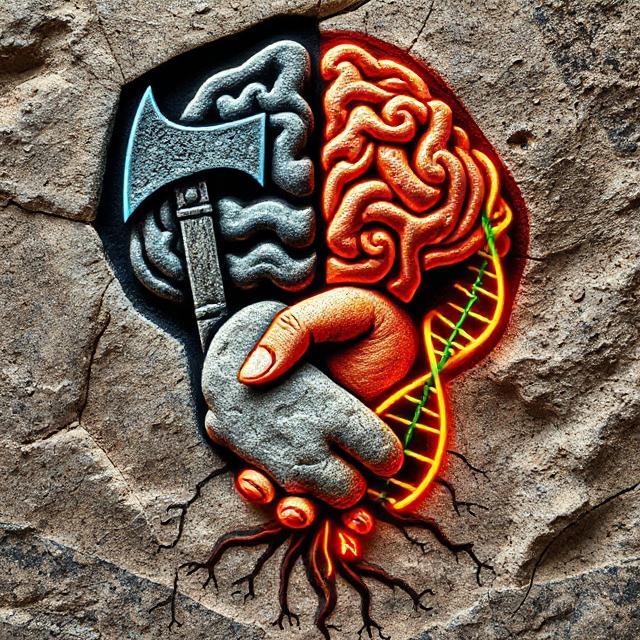
Table of Contents
Are Humans Naturally Violent or Peaceful?
The question “Are humans naturally violent or peaceful?” has intrigued thinkers, scientists, and social leaders for centuries. It touches on the very essence of human nature, influencing how we understand ourselves, build societies, and address conflicts.
Are we biologically wired for aggression and warfare, or is peace our default state? Or perhaps, are both tendencies embedded within us, expressed under different circumstances?
This article explores the historical, philosophical, psychological, and biological viewpoints on human nature, violence, and peace, offering a nuanced understanding of this enduring debate.
I. The Origins of the Debate: Hobbes vs. Rousseau
Two towering figures set the stage for this question in Western philosophy:
- Thomas Hobbes (1588–1679) famously described human life in the “state of nature” as “solitary, poor, nasty, brutish, and short.” He argued humans are naturally violent, driven by self-interest and competition. According to Hobbes, strong governance is necessary to curb this innate aggression.
- Jean-Jacques Rousseau (1712–1778) countered that humans in their natural state are peaceful and compassionate “noble savages.” Rousseau believed violence and corruption arise from civilization’s inequalities and social institutions.
These opposing views frame the central tension: is violence inherent or socially constructed?
II. Anthropological and Historical Evidence
The fossil record, archaeological findings, and studies of indigenous societies offer mixed signals:
- Evidence for violence: Some prehistoric human groups show signs of violent conflict—injuries, mass graves, and weapons suggest warfare existed early on.
- Evidence for peace: Many hunter-gatherer societies display cooperative, egalitarian social structures with low levels of violence.
- Variability across cultures: Violence varies widely across human societies, with some being highly peaceful and others more warlike.
Anthropologists argue that humans have flexible behavioral repertoires shaped by environment and culture, capable of both violence and cooperation.
III. Evolutionary Psychology and Biology of Violence
From a biological standpoint:
- Aggression as survival: Evolutionary theory suggests aggression could have been advantageous for securing resources, defending kin, and asserting dominance.
- Neuroscience of aggression: Brain regions like the amygdala and hypothalamus regulate aggressive responses. Hormones such as testosterone can influence aggression.
- Innate empathy and cooperation: Humans also evolved capacities for empathy, altruism, and cooperation—key for group survival.
The dual nature of human biology points to a complex interplay between violent impulses and peaceful instincts.
IV. Philosophical Perspectives on Human Nature
Philosophers have reflected deeply on whether violence or peace is more natural:
- Existentialists emphasize that humans are not fixed by nature but create themselves through choices, implying violence or peace depends on freedom and responsibility.
- Virtue ethicists like Aristotle consider peace a virtue to be cultivated, while uncontrolled aggression reflects a lack of self-mastery.
- Social contract theorists focus on how societies regulate innate impulses through laws and norms.
The philosophical consensus often highlights human potential rather than fixed destiny.
V. Psychology of Aggression and Peace
Modern psychology studies how violence arises and how peace can be fostered:
- Frustration-aggression hypothesis: Aggression can result from blocked goals or threats.
- Social learning theory: People learn violent or peaceful behaviors by observing role models.
- Conflict resolution and empathy training: Programs that develop emotional intelligence and communication skills reduce aggression.
Psychology underscores that context, upbringing, and education strongly shape human behavior.
VI. Violence, War, and Peace in History
History reveals cycles of violence and peace:
- Wars and conflict: Human history is marked by frequent warfare, genocide, and oppression.
- Periods of peace: Yet, there have been significant eras and societies characterized by peace, diplomacy, and justice.
- Peacebuilding efforts: International law, diplomacy, and movements for human rights demonstrate human capacity to choose peace.
History reflects human complexity, showing neither violence nor peace as absolute.
VII. Cultural and Societal Influences
Culture plays a decisive role in shaping violence or peace:
- Honor cultures vs. dignity cultures: Some cultures prioritize retaliation and honor, others emphasize forgiveness and human dignity.
- Economic and social inequalities: Structural injustices often breed violence, while equitable societies tend to be more peaceful.
- Media and technology: These influence how violence is normalized or condemned.
Cultural norms can either amplify or restrain violent tendencies.
VIII. Are We Naturally Violent or Peaceful? A Balanced View
The most compelling conclusion is that humans are neither inherently violent nor inherently peaceful but possess both potentials.
- Our biology provides capacities for aggression and cooperation.
- Our environment, culture, and personal experiences activate or suppress these tendencies.
- Free will, education, and social systems play critical roles in fostering peace.
We are thus complex beings shaped by nature and nurture, capable of both destruction and compassion.
IX. Implications for the Future
Understanding this duality has practical consequences:
- Peace education: Teaching empathy, critical thinking, and conflict resolution from early childhood can nurture peaceful tendencies.
- Justice systems: Balanced approaches that combine accountability with rehabilitation may reduce cycles of violence.
- Global cooperation: Recognizing shared humanity can motivate collective efforts toward peace.
By choosing peace, humanity can transcend its violent potentials.
X. Conclusion: The Choice Within Us
Are humans naturally violent or peaceful? The answer lies in recognizing our dual nature and embracing our responsibility to cultivate peace.
Violence may be part of our biological heritage, but peace is our highest potential and conscious choice. Through reflection, education, and community, we can align more closely with our peaceful nature and create a better world for generations to come.